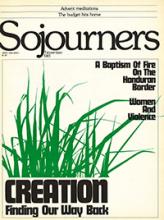Christian theology in the West seems at a loss in dealing with the environmental crisis that threatens our earthly home. The medieval mind conceived of all things, including one's own body, as comprised of four elements: Earth, Water, Air, and Fire. A person was a part of these, and they of that person. But the modern Western mind studies these elements as a detached observer, even predicting their future. Those I predictions are ominous.
Earth--the thin strata of soil supporting our life--is being diminished far more rapidly than it is being replenished. Erosion washes soil away, chemicals burn it out, urbanization buries it under pavement, strip mining tears it apart, rural gentrification turns it into luxury turf, and cash cropping colonizes it to satisfy the tastes of the rich rather than the hungers of the poor.
Water--which brings the earth to life and flows through our bodies--is being drained away dramatically enough to make the cover of Newsweek. Sixty-one billion gallons per day soak into the ground from the sky; 82 billion gallons are withdrawn from ground water each day and used with a faith which seems to assume that turning a faucet manufactures H20.
Air--which covers the earth with a protective shield and moves in and out of our bodies with each life-giving breath--is being invaded with poisonous wastes. Because they rise up in smoke, we think the wastes rise away from us not to return. But return they do, as smog, acid rain, and other noxious pollutants.
Read the Full Article

